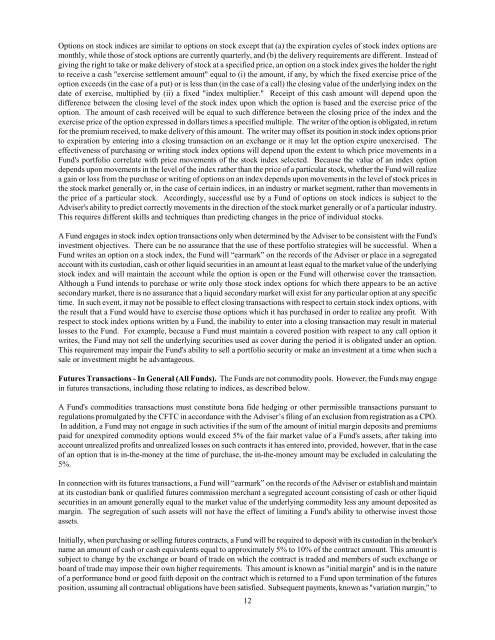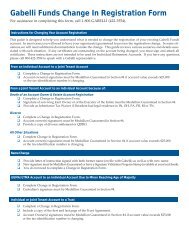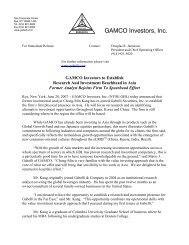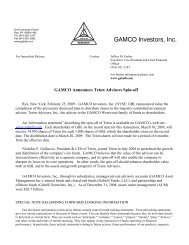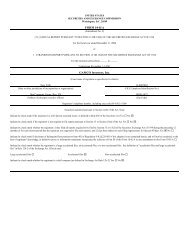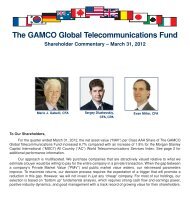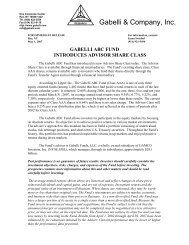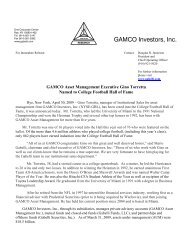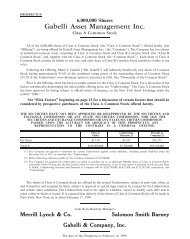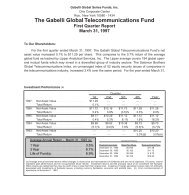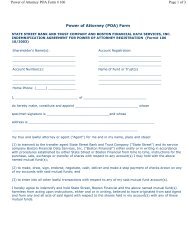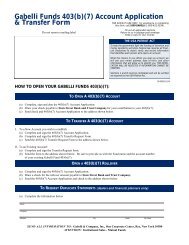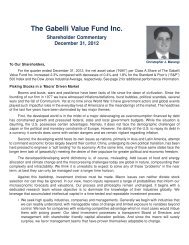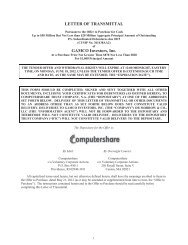Statement of Additional Info - Gabelli
Statement of Additional Info - Gabelli
Statement of Additional Info - Gabelli
You also want an ePaper? Increase the reach of your titles
YUMPU automatically turns print PDFs into web optimized ePapers that Google loves.
Options on stock indices are similar to options on stock except that (a) the expiration cycles <strong>of</strong> stock index options are<br />
monthly, while those <strong>of</strong> stock options are currently quarterly, and (b) the delivery requirements are different. Instead <strong>of</strong><br />
giving the right to take or make delivery <strong>of</strong> stock at a specified price, an option on a stock index gives the holder the right<br />
to receive a cash "exercise settlement amount" equal to (i) the amount, if any, by which the fixed exercise price <strong>of</strong> the<br />
option exceeds (in the case <strong>of</strong> a put) or is less than (in the case <strong>of</strong> a call) the closing value <strong>of</strong> the underlying index on the<br />
date <strong>of</strong> exercise, multiplied by (ii) a fixed "index multiplier." Receipt <strong>of</strong> this cash amount will depend upon the<br />
difference between the closing level <strong>of</strong> the stock index upon which the option is based and the exercise price <strong>of</strong> the<br />
option. The amount <strong>of</strong> cash received will be equal to such difference between the closing price <strong>of</strong> the index and the<br />
exercise price <strong>of</strong> the option expressed in dollars times a specified multiple. The writer <strong>of</strong> the option is obligated, in return<br />
for the premium received, to make delivery <strong>of</strong> this amount. The writer may <strong>of</strong>fset its position in stock index options prior<br />
to expiration by entering into a closing transaction on an exchange or it may let the option expire unexercised. The<br />
effectiveness <strong>of</strong> purchasing or writing stock index options will depend upon the extent to which price movements in a<br />
Fund's portfolio correlate with price movements <strong>of</strong> the stock index selected. Because the value <strong>of</strong> an index option<br />
depends upon movements in the level <strong>of</strong> the index rather than the price <strong>of</strong> a particular stock, whether the Fund will realize<br />
a gain or loss from the purchase or writing <strong>of</strong> options on an index depends upon movements in the level <strong>of</strong> stock prices in<br />
the stock market generally or, in the case <strong>of</strong> certain indices, in an industry or market segment, rather than movements in<br />
the price <strong>of</strong> a particular stock. Accordingly, successful use by a Fund <strong>of</strong> options on stock indices is subject to the<br />
Adviser's ability to predict correctly movements in the direction <strong>of</strong> the stock market generally or <strong>of</strong> a particular industry.<br />
This requires different skills and techniques than predicting changes in the price <strong>of</strong> individual stocks.<br />
A Fund engages in stock index option transactions only when determined by the Adviser to be consistent with the Fund's<br />
investment objectives. There can be no assurance that the use <strong>of</strong> these portfolio strategies will be successful. When a<br />
Fund writes an option on a stock index, the Fund will “earmark” on the records <strong>of</strong> the Adviser or place in a segregated<br />
account with its custodian, cash or other liquid securities in an amount at least equal to the market value <strong>of</strong> the underlying<br />
stock index and will maintain the account while the option is open or the Fund will otherwise cover the transaction.<br />
Although a Fund intends to purchase or write only those stock index options for which there appears to be an active<br />
secondary market, there is no assurance that a liquid secondary market will exist for any particular option at any specific<br />
time. In such event, it may not be possible to effect closing transactions with respect to certain stock index options, with<br />
the result that a Fund would have to exercise those options which it has purchased in order to realize any pr<strong>of</strong>it. With<br />
respect to stock index options written by a Fund, the inability to enter into a closing transaction may result in material<br />
losses to the Fund. For example, because a Fund must maintain a covered position with respect to any call option it<br />
writes, the Fund may not sell the underlying securities used as cover during the period it is obligated under an option.<br />
This requirement may impair the Fund's ability to sell a portfolio security or make an investment at a time when such a<br />
sale or investment might be advantageous.<br />
Futures Transactions - In General (All Funds). The Funds are not commodity pools. However, the Funds may engage<br />
in futures transactions, including those relating to indices, as described below.<br />
A Fund's commodities transactions must constitute bona fide hedging or other permissible transactions pursuant to<br />
regulations promulgated by the CFTC in accordance with the Adviser’s filing <strong>of</strong> an exclusion from registration as a CPO.<br />
In addition, a Fund may not engage in such activities if the sum <strong>of</strong> the amount <strong>of</strong> initial margin deposits and premiums<br />
paid for unexpired commodity options would exceed 5% <strong>of</strong> the fair market value <strong>of</strong> a Fund's assets, after taking into<br />
account unrealized pr<strong>of</strong>its and unrealized losses on such contracts it has entered into, provided, however, that in the case<br />
<strong>of</strong> an option that is in-the-money at the time <strong>of</strong> purchase, the in-the-money amount may be excluded in calculating the<br />
5%.<br />
In connection with its futures transactions, a Fund will “earmark” on the records <strong>of</strong> the Adviser or establish and maintain<br />
at its custodian bank or qualified futures commission merchant a segregated account consisting <strong>of</strong> cash or other liquid<br />
securities in an amount generally equal to the market value <strong>of</strong> the underlying commodity less any amount deposited as<br />
margin. The segregation <strong>of</strong> such assets will not have the effect <strong>of</strong> limiting a Fund's ability to otherwise invest those<br />
assets.<br />
Initially, when purchasing or selling futures contracts, a Fund will be required to deposit with its custodian in the broker's<br />
name an amount <strong>of</strong> cash or cash equivalents equal to approximately 5% to 10% <strong>of</strong> the contract amount. This amount is<br />
subject to change by the exchange or board <strong>of</strong> trade on which the contract is traded and members <strong>of</strong> such exchange or<br />
board <strong>of</strong> trade may impose their own higher requirements. This amount is known as "initial margin" and is in the nature<br />
<strong>of</strong> a performance bond or good faith deposit on the contract which is returned to a Fund upon termination <strong>of</strong> the futures<br />
position, assuming all contractual obligations have been satisfied. Subsequent payments, known as "variation margin," to<br />
12


